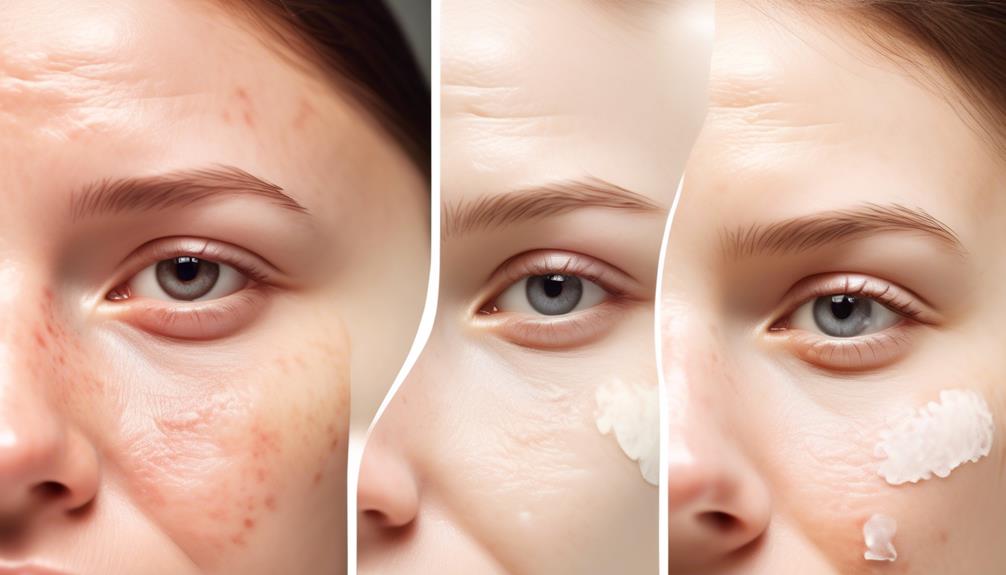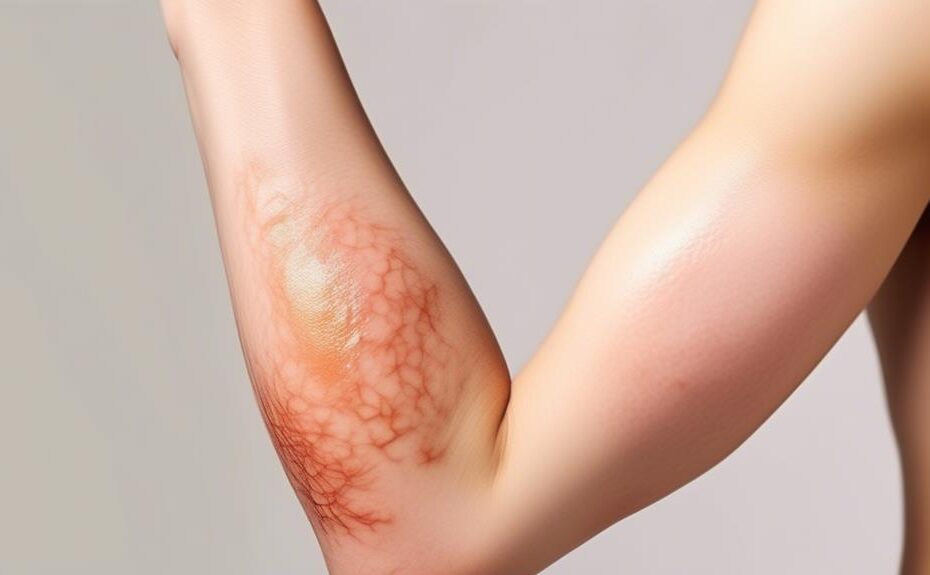Castor Oil Help Eczema: A Moisturizing Solution That Shows Promise Are you searching for effective remedies to soothe your eczema? Look no further than castor oil. This natural oil, derived from the beans of the castor plant, has gained attention for its hydrating properties and high omega-9 fatty acid content. But how does it work?
Well, castor oil has the incredible ability to lock in moisture, making it a fascinating option for those seeking relief from eczema symptoms. While scientific research has not yet firmly established the connection between castor oil and eczema reduction, some products designed for this condition do contain this oil. In fact, a recent review even suggested that a cream with castor oil can help prevent eczema flare-ups.
So, what are the potential benefits and risks of using castor oil for eczema? Let’s dive in.
First and foremost, castor oil may provide much-needed relief from itching and irritation, as well as deeply hydrate the skin. Additionally, it could offer protection against infections and slow down the excessive growth of skin cells associated with eczema. And that’s not all – castor oil might even have the potential to reduce eczema-related scars.
But wait, there’s more! Let’s not forget about using castor oil specifically for the scalp. Many individuals with eczema struggle with dry, itchy scalps, and castor oil can come to the rescue. Its moisturizing properties can help alleviate discomfort and promote a healthier scalp.
Of course, as with any treatment, it’s important to consider safety and potential risks. Always perform a patch test before using castor oil on a larger area of your skin, as some people may experience allergic reactions. And while castor oil is generally safe for topical use, it’s best to consult with a healthcare professional, especially if you have any underlying medical conditions.
In conclusion, castor oil shows promise as a moisturizing solution for eczema. While more research is needed to fully understand its effectiveness, many individuals have found relief from their symptoms by incorporating castor oil into their skincare routine. So why not give it a try? Your skin may thank you for it.
Key Takeaways
- Castor oil is a hydrating oil extracted from the beans of the castor plant, found in tropical rainforests.
- It is often used topically for eczema by mixing with carrier oils and applying to clean skin after a bath or shower.
- While there is no established link between castor oil and reducing eczema symptoms, some products for eczema do contain castor oil.
- Using castor oil for eczema may relieve itching and irritation, hydrate the skin, offer protection against infection, and slow down skin cell growth.
What Is Castor Oil?
Castor oil, extracted from the beans of the castor plant found in tropical rainforests, is a versatile oil known for its hydrating properties and high content of omega-9 fatty acids. It is referred to as a humectant due to its ability to attract and retain moisture in the skin.
The oil is available in two forms: yellow castor oil, which is cold-pressed, and black castor oil, derived from roasted castor beans. Castor oil has numerous benefits for the skin, including relieving itching and irritation, hydrating the skin, offering protection against infection, and slowing down skin cell growth. Additionally, it may help reduce scars caused by eczema.
These properties make castor oil a potential treatment option for individuals with eczema.

Using Castor Oil for Eczema
The use of castor oil as a potential treatment for eczema has gained attention due to its moisturizing and protective properties. While there is no established link between castor oil and reducing eczema symptoms, some individuals find relief from itching and irritation when using this natural remedy.
When compared to other natural remedies for eczema, castor oil stands out due to its hydrating qualities and its ability to slow down skin cell growth. However, it is important to note that castor oil should not replace prescription-based treatments for eczema.
Potential side effects of using castor oil for eczema include allergic reactions, so it is recommended to perform a patch test before applying it to a larger area of the skin. Additionally, individuals with dandruff should avoid using castor oil.
Here is a table comparing castor oil with other natural remedies for eczema:
| Natural Remedy | Benefits | Drawbacks |
|---|---|---|
| Castor Oil | Hydrates the skin, offers protection against infection, slows down skin cell growth | No established link to reducing eczema symptoms |
| Coconut Oil | Moisturizes the skin, has antibacterial properties | May clog pores and worsen acne |
| Aloe Vera | Soothes irritated skin, reduces inflammation | Possible allergic reactions |
| Tea Tree Oil | Has antimicrobial properties, reduces itching and inflammation | Can cause skin irritation in some individuals |
| Calendula | Helps soothe dry and itchy skin, promotes healing | May cause allergic reactions in some people |
Effectiveness of Castor Oil for Eczema

The effectiveness of castor oil as a treatment for eczema has been a subject of interest due to its potential hydrating and protective properties. While there is no established link between castor oil and reducing eczema symptoms, some products for eczema do contain castor oil.
A 2018 review found that a cream with castor oil prevented eczema flares. When comparing castor oil to other natural remedies for eczema, it is important to consider potential side effects. Castor oil is generally safe to use on the skin, but there is a possibility of allergic reactions, so a patch test is recommended.
It should not replace prescription-based treatments and should be used with caution if you have dandruff. When it comes to the scalp and hair, castor oil can moisturize a dry, irritated scalp, but alternatives like rosemary oil can also be considered.
Benefits of Castor Oil for Eczema
Using castor oil for eczema can provide several benefits for those experiencing symptoms of this skin condition. Castor oil is known for its hydrating properties and contains omega-9 fatty acids, which can help moisturize and protect the skin. It also has anti-inflammatory properties that can help relieve itching and irritation associated with eczema. Additionally, castor oil may help reduce the appearance of scars caused by eczema by slowing down skin cell growth. To summarize the benefits of castor oil for eczema, refer to the table below:
| Benefits of Castor Oil for Eczema |
|---|
| Relieves itching and irritation |
| Hydrates the skin |
| Offers protection against infection |
| Slows down skin cell growth |
| May help reduce scars caused by eczema |
Using Castor Oil for Eczema on the Scalp

Castor oil can be used effectively on the scalp to provide moisture and relief for individuals experiencing eczema symptoms in that area. Here are some ways to use castor oil for eczema on the scalp:
- Applying cold-pressed castor oil directly to the scalp: This helps moisturize the dry and irritated scalp, reducing itching and irritation.
- Using black castor oil on the scalp: Black castor oil, derived from roasted castor beans, is known for its moisturizing properties and can provide relief for eczema symptoms on the scalp.
- Applying a follicle sealing technique: After applying castor oil to the scalp, using a technique to seal the follicles can help retain moisture and further alleviate eczema symptoms.
- Considering alternative hair treatments: Rosemary oil, known for its anti-inflammatory properties, can be used as an alternative hair treatment for eczema on the scalp, providing both relief and moisturization.
Safety and Risks of Using Castor Oil for Eczema
Continuing our exploration of the use of castor oil for eczema, it is important to discuss the safety and potential risks associated with its application. While castor oil is generally safe to use on the skin, it is important to be aware of potential allergic reactions. Before applying castor oil, it is recommended to perform a patch test to check for any adverse reactions. Additionally, individuals with dandruff should avoid using castor oil as it may exacerbate the condition. It is important to note that castor oil should not be used as a replacement for prescription-based treatments for eczema. When it comes to using castor oil on the scalp and hair, it can be safe, but it is always advisable to consult with a healthcare professional before use.
| Safety of Castor Oil for Eczema | Potential Risks of Castor Oil for Eczema |
|---|---|
| Generally safe for skin use | Possibility of allergic reactions |
| Perform patch test before use | May worsen dandruff |
| Not a replacement for prescription treatments | |
| Can be safe for scalp and hair |
Frequently Asked Questions
Are There Any Potential Side Effects of Using Castor Oil for Eczema?
Potential risks associated with using castor oil for eczema include allergic reactions. It is important to do a patch test before use. While generally safe, castor oil should not replace prescription-based treatments for eczema.
Can Castor Oil Be Used as a Standalone Treatment for Eczema?
Castor oil can be used as a standalone treatment for eczema, but there is no established link between its effectiveness and reducing eczema symptoms. There are alternative oils available with potential benefits for other skin conditions.
How Long Does It Typically Take to See Results When Using Castor Oil for Eczema?
The time it takes to see results when using castor oil for eczema can vary. It may take several weeks of consistent use to notice any potential benefits. Application techniques include mixing with other oils and applying to clean skin after bathing.
Can Castor Oil Be Used on All Types of Eczema, Including Severe Cases?
Castor oil’s effectiveness for severe cases of eczema remains uncertain. While some products contain castor oil and a 2018 review reported its potential to prevent eczema flares, further research is needed to determine its efficacy. Its impact on worsening eczema symptoms is also unclear.
Are There Any Specific Precautions or Considerations When Using Castor Oil for Eczema on Children or Infants?
When using castor oil for eczema on children or infants, it is important to take precautions. While castor oil is generally safe, potential side effects and allergic reactions should be considered. Consult a healthcare professional before using on young children.
Conclusion:Castor Oil Help Eczema
In conclusion, castor oil shows potential as a remedy for eczema due to its hydrating properties and composition of omega-9 fatty acids.
While there is no established link between castor oil and reducing eczema symptoms, some products contain this oil and a study found that a cream with castor oil helped prevent flare-ups.
Castor oil may relieve itching, hydrate the skin, offer protection against infection, slow down skin cell growth, and potentially reduce scars caused by eczema.
Safety considerations and potential risks should be taken into account when using castor oil for eczema.





